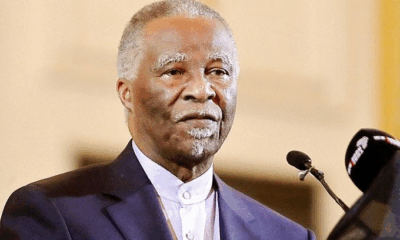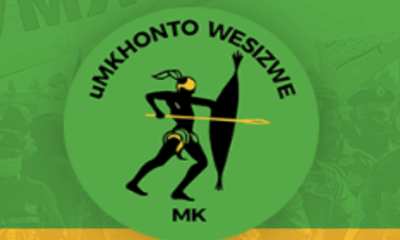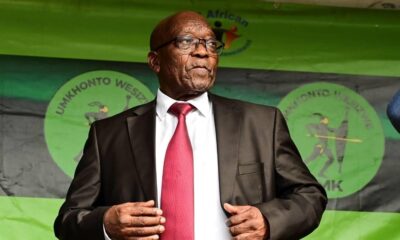News
MK Party Pushes Bold Constitutional Overhaul: Land, Leadership, and Loyalty

From land reform to direct democracy, the MK Party’s 2025 proposals are stirring serious debate
South Africa may be heading toward one of the most transformative constitutional reviews since 1996, thanks to a controversial set of proposals put forward by the uMkhonto weSizwe (MK) Party. The party, barely a year old but already punching above its political weight, has submitted a sweeping set of amendments that could redraw the legal and ideological map of the country.
Framed as a “citizen-first” revision of the Constitution, the MK Party says its proposals are rooted in restoring dignity to the indigenous majority and asserting national sovereignty. But the sheer scope of the proposed changes—spanning land, elections, citizenship, and even military service—has left the country asking: bold vision or political fantasy?
Land Without Compensation: The Old Debate Gets New Teeth
At the heart of the MK Party’s plan is a controversial revision to Section 25 of the Constitution to allow land expropriation without compensation. The party argues the current property rights framework protects those who benefited from “colonial and apartheid land theft” while placing the financial burden on the state to compensate for stolen land.
Land reform has long been South Africa’s deepest unresolved wound. But the MK’s timing—amid renewed claims by former US President Donald Trump about alleged “white genocide”—adds a global spotlight. Trump’s claims, once dismissed as fringe, resurfaced recently as a small number of white Afrikaners migrated to the US under Trump-era resettlement offers. South African officials have strongly condemned these allegations as misleading and inflammatory.
Power to the People: Direct Presidential Elections
The MK Party also wants to give South Africans the direct power to elect their president, shifting away from the current party-list system. This idea has long had public appeal but faces opposition from establishment parties wary of diluting internal control.
While parties like the ANC remain quiet on this, opposition leaders on social media have started speculating about what this could mean for the political landscape—especially with younger voters increasingly disillusioned with traditional politics.
Military Boots and Patriotic Roots
One of the most eye-catching suggestions? Compulsory military service for all citizens aged 18 to 25. The MK Party argues that this will instill discipline, national pride, and unity—though critics fear it signals a drift toward authoritarianism.
On platforms like X (formerly Twitter), the public response has been sharply divided. Some see it as a nation-building tool; others call it “forced patriotism” in a country still healing from decades of state violence.
A Constitution for South Africans, By South Africans?
The MK Party wants to restrict citizenship and voting rights to those born of two South African parents and limit electoral participation to individuals who hold only South African citizenship. According to party spokesperson Nhlamulo Ndhlela, this will “ensure loyalty and allegiance” to the Republic.
This echoes a growing sentiment across the political spectrum. Even ActionSA’s Athol Trollip recently called for tighter public service protections for citizens, especially in sectors like housing, health, and education—where foreign nationals often compete for limited resources.
Mining, Money, and a State Bank
The party isn’t stopping at politics. It wants to nationalise South Africa’s strategic minerals and create a sovereign wealth fund, echoing resource-control models seen in countries like Norway and Botswana.
More radically, it’s pushing for the establishment of a state-owned bank with constitutional powers to print currency—a direct challenge to what the MK Party calls the “monopoly of white capital” in South Africa’s financial system.
A Capital Move and Institutional Shake-Up
Another symbolic shift? Moving Parliament out of Cape Town to align with the executive and judiciary. The MK Party says this will unify governance structures, though critics see it as political theatre.
They also want to restructure Chapter Nine institutions—merging the Public Protector’s office with the Special Investigating Unit and elevating the National Prosecuting Authority to constitutional status. This, they argue, would streamline oversight and tackle corruption more effectively.
A New Chapter or Political Overreach?
To supporters, the MK Party’s constitutional wish list reads like a long-overdue rewrite of a post-apartheid document that, they say, still protects colonial interests. To critics, it’s an overreach that mixes populism with unworkable idealism.
But what’s undeniable is that these proposals have sparked real conversation—about who South Africa belongs to, how it’s governed, and what kind of future its people want to build.
As the 2025 Constitutional Review looms, the question now is whether these bold ideas will reshape the country—or fade into political footnotes.
{Source: IOL}
Follow Joburg ETC on Facebook, Twitter , TikTok and Instagram
For more News in Johannesburg, visit joburgetc.com



























